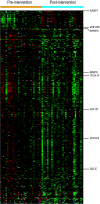Changes in prostate gene expression in men undergoing an intensive nutrition and lifestyle intervention
- PMID: 18559852
- PMCID: PMC2430265
- DOI: 10.1073/pnas.0803080105
Changes in prostate gene expression in men undergoing an intensive nutrition and lifestyle intervention
Abstract
Epidemiological and prospective studies indicate that comprehensive lifestyle changes may modify the progression of prostate cancer. However, the molecular mechanisms by which improvements in diet and lifestyle might affect the prostate microenvironment are poorly understood. We conducted a pilot study to examine changes in prostate gene expression in a unique population of men with low-risk prostate cancer who declined immediate surgery, hormonal therapy, or radiation and participated in an intensive nutrition and lifestyle intervention while undergoing careful surveillance for tumor progression. Consistent with previous studies, significant improvements in weight, abdominal obesity, blood pressure, and lipid profile were observed (all P < 0.05), and surveillance of low-risk patients was safe. Gene expression profiles were obtained from 30 participants, pairing RNA samples from control prostate needle biopsy taken before intervention to RNA from the same patient's 3-month postintervention biopsy. Quantitative real-time PCR was used to validate array observations for selected transcripts. Two-class paired analysis of global gene expression using significance analysis of microarrays detected 48 up-regulated and 453 down-regulated transcripts after the intervention. Pathway analysis identified significant modulation of biological processes that have critical roles in tumorigenesis, including protein metabolism and modification, intracellular protein traffic, and protein phosphorylation (all P < 0.05). Intensive nutrition and lifestyle changes may modulate gene expression in the prostate. Understanding the prostate molecular response to comprehensive lifestyle changes may strengthen efforts to develop effective prevention and treatment. Larger clinical trials are warranted to confirm the results of this pilot study.
Conflict of interest statement
Conflict of interest statement: Although none of the following is a true conflict of interest, in the spirit of full disclosure, D.O. writes general-interest books on preventive medicine, receives lecture honoraria, and consults with food companies to make more healthful foods.
Figures




References
-
- Chan JM, Gann PH, Giovannucci EL. Role of diet in prostate cancer development and progression. J Clin Oncol. 2005;32:8152–8160. - PubMed
-
- Chan JM, et al. Diet after diagnosis and the risk of prostate cancer progression, recurrence, and death (United States) Cancer Causes Control. 2006;17:199–208. - PubMed
-
- Yu H, Harris RE, Gao YT, Gao R, Wynder EL. Comparative epidemiology of cancers of the colon, rectum, prostate and breast in Shanghai, China versus the United States. Int J Epidemiol. 1991;20:76–81. - PubMed
-
- Ornish D, et al. Intensive lifestyle changes may affect the progression of prostate cancer. J Urol. 2005;174:1065–1069. discussion 1069–1070. - PubMed
-
- Ornish DM, et al. Dietary trial in prostate cancer: Early experience and implications for clinical trial design. Urology. 2001;57:200–201. - PubMed
Publication types
MeSH terms
Associated data
- Actions
Grants and funding
LinkOut - more resources
Full Text Sources
Other Literature Sources
Medical
Molecular Biology Databases

